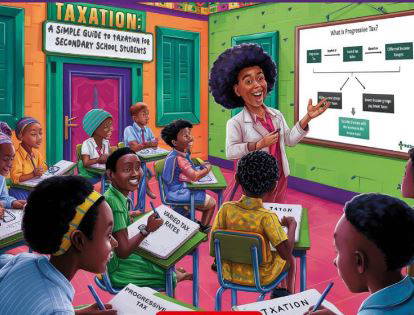Dr. Zacch Adedeji, Chairman of the Federal Inland Revenue Service (FIRS), has emphasised the need of developing an interest in taxation issues among young people, particularly youngsters, and how this fundamental responsibility of citizens drives national development and infrastructure in the country. Adedeji made this public in the foreword of a book ‘Taxation: Essential Knowledge for Nigerian Children’ jointly authored by Arabinrin Aderonke and Ejura Blessing Haruna.
According to him, “the book not only emphasises the importance of understanding taxation, but it also serves as a foundational resource for children to grasp critical concepts that will shape their financial futures.” Dr. Zacch Adedeji emphasised that “understanding taxation is not just an academic exercise, but a critical life skill that will benefit children as they grow into adults.”
His support is a striking reminder of the broader societal ramifications of tax education, confirming Haruna’s message that informed individuals are critical to a flourishing democracy. Furthermore, Dr. Adedeji’s professional perspective emphasises the critical need for tax literacy among younger generations, especially in underdeveloped nations where financial education is frequently inadequate.
His endorsement emphasises the book’s importance and presents it as an indispensable resource for parents, educators, and policymakers alike. In an era when financial literacy is widely recognised as a necessary ability for managing the complexity of modern life, Arabinrin Aderonke and Ejura Haruna’s “Taxation: Essential Knowledge for Children” stands out as an important contribution to educational literature.
While dissecting the book, Matilda Samuel Georgewill of Ahmadu Bello University in Zaria stated that Aderonke and Haruna’s book opens with a thoughtful introduction to the notion of taxation that is targeted exclusively for youngsters.
“The author uses straightforward language and relevant examples to explain what taxes are, why they are collected, and how they benefit society. “This core information is critical because it lays the groundwork for further exploration in following chapters. By presenting taxation as a social responsibility rather than a burden, “Aderonke and Haruna encourage young readers to see taxes as a way of giving back to their communities and supporting public services.
“The book’s technique is particularly effective at piqueing children’s interest. Aderonke and Haruna use pictures and anecdotes that appeal to a younger audience, making complicated ideas understandable. “For example, the author could equate taxes to donations made by family members for a group outing, allowing children to relate to the notion on a personal level.
“This technique promotes comprehension while also instilling a sense of responsibility and civic pride. Georgewill commented on the book’s structure and content, saying, “The 10 chapters of “Taxation: Essential Knowledge for Children” are methodically organised, each building on the last to provide a comprehensive overview of taxation.
“The chapters cover a wide range of issues, including the history of taxation, various forms of taxes, and the role of government in tax collecting and distribution. “The authors’ gradual approach ensures that readers can keep up without getting overwhelmed. “One outstanding chapter dives into the numerous sorts of taxes, including income tax, sales tax, and property tax, and provides clear explanations and examples for each.
“This section is especially useful because it emphasises the diversity of the tax system and helps children understand that taxes are not a monolithic concept.” Furthermore, Aderonke and Haruna address widespread misconceptions concerning taxes, such as the notion that they are only punitive measures imposed by governments.
Aderonke and Haruna emphasise the importance of tax revenues in funding essential services like education, healthcare, and infrastructure. Using real-world scenarios, such as building parks or schools in a community, enhances the learning experience and encourages critical thinking.
“These exercises range from simple quizzes to creative projects that encourage children to consider taxation in their own lives.” “For example, readers may be asked to build a budget that includes hypothetical tax payments or to describe how they would allocate tax dollars if given the option.
“This participatory method is especially effective in developing a sense of agency in young readers. Engage them in discussions about taxation and its ramifications. “Haruna teaches children to take responsibility for their understanding and urges them to become informed citizens. “Activities make the learning process more interesting, changing what may be a dry subject into an engaging experience.
This book, which contains thirteen precisely crafted chapters, tries to help younger readers understand the typically scary subject of taxation. “Through its interesting material, systematic methodology, and interactive aspects, the book teaches children about taxation while instilling a feeling of civic responsibility.
Sprezzatura Publishing Limited has published this children’s book, which was edited by Dr. MS Abubakar. “It is strongly advised that this book be disseminated to educational institutions nationwide, as it aims to engage young learners in understanding taxation, ensuring a smooth transition into responsible taxpayers as they mature.”











